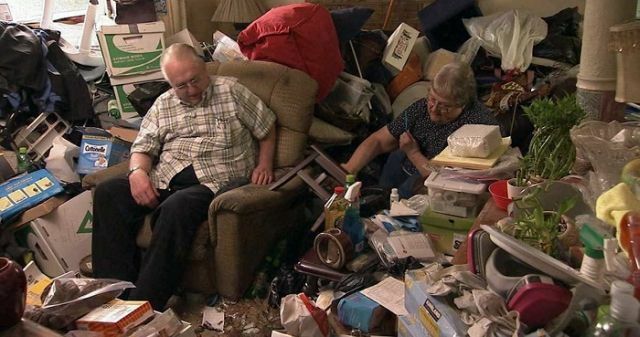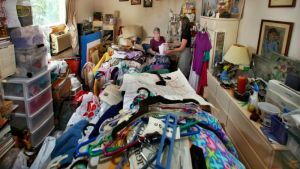 Diogenes syndrome is a mental disorder, for which the desire to collect and accumulate various unnecessary things( syllogism), slovenliness, social isolation and abulia is typical.
Diogenes syndrome is a mental disorder, for which the desire to collect and accumulate various unnecessary things( syllogism), slovenliness, social isolation and abulia is typical.
A special deviation in behavior was called the name of the legendary ancient Greek philosopher, who entered the history due to extreme unpretentiousness and living in a barrel( according to another version - in a large earthen vessel).Many modern specialists consider it not quite correct, since Diogenes did not aspire to material values, preferring spiritual food to them.
The phenomenon of pathological accumulation is known to psychiatry for more than one century. Officially, the term "Diogenes syndrome" was made in 1975 in the writings of psychiatrists Maynkikar, Clark and Gray.
In domestic medicine, the disease is more commonly known as social decay, senile dementia, senile poverty syndrome or Plyushkin( by analogy with the behavior of the character of "Dead Souls" by NV Gogol).
Syndrome is especially common in European countries. It is diagnosed in 3% of persons who have reached the age of 65 years. There are cases of manifestation of deviation among younger patients.

A typical picture of a patient's behavior
A typical picture of the course of a disease is as follows: the room where Plyushkin resides is packed with unnecessary trash( waste paper, old clothes, spoiled products, parts, furniture).In most cases, all these values fall into the house from garbage cans. Often patients bring animals to the house, including the dead.
The situation is very critical. Against the backdrop of senseless gathering, there is an active degradation of the personality, disregard of the patient to his own person, apathy and isolation.
Accumulation of trash leads to unsanitary conditions, from which most suffer from others. In response to attempts to determine all the trash back to the trash, the patient expresses a stormy protest, becomes uncommunicative, starts to fool around and avoid contact with others.
In most cases, people with the syndrome of senile poverty are perceived from the side as unhappy and half-starved poor devils. Often things are quite different. At all not well-groomed kind they can have careful close and native, and also considerable monetary conditions.
Causes and symptoms of development of a disorder
Most often, Diogenes syndrome develops in old age due to the experiences of stressful experiences and severe shocks.
A large number of people with a similar deviation appear after events of a global scale - wars, famine, global catastrophes.
Among other causes of the development of the disease are:
- generic and craniocerebral trauma;
- neoplasm in the frontal lobes of the brain;
- adverse effects of operations;
- abuse of alcohol and drugs;
- organic brain damage;
- pathological dependence on collecting;
- long loneliness.
Cases of the disease can also be triggered by harmful production or other adverse environmental effects.
Symptoms of the disease at an early stage do not cause much excitement in others. Often in the patient's room there is a stable creative disorder, which he explains by strong employment.
Some time later the symptoms become more pronounced, the symptoms of the progression of Plyushkin's syndrome: 
- tremulous storage of old unnecessary things and reluctance to get rid of them;
- constant confusion, refusal to maintain cleanliness in the room;
- neglect of personal hygiene and appearance;
- closedness, antisocial behavior;
- aggression when trying to change the situation;
- expressed greed and frugality;
- indifference, dullness of the sense of shame.
Due to neglect of hygiene, the patient can develop various infections, skin diseases. In this case, the patient often categorically refuses treatment even at home. There comes a time of complete alienation from the surrounding reality.
Stages of the course of the disease
In neurological practice, several stages of the course of the Diogenes syndrome are distinguished:
- The disorder in the patient's room is the norm for others. A lot of free space remains in the room, and human behavior does not cause excitement.
- Dustbins are filled to the brim, in the rooms there is an unpleasant smell and the first mold.

- There is a lot of confusion in the house, piles of rubbish cover all the aisles. Due to the unsanitary condition, a stench spreads everywhere.
- The room becomes unsuitable for living, plumbing and furniture are in a state of neglect, mold appears on them.
- The patient's habitat is not at all suitable for life. Damage to walls, ceilings, etc. is noted. The neighbors experience discomfort from the stench coming from the apartment, numerous complaints are received by the problem tenant.
When the situation goes too far, and a constructive dialogue with the patient is impossible, compulsory treatment in a psychiatric hospital is indicated.
Treatment of involuntary Diogenes and Plyushkin
Computer tomography of the brain is used as a reliable method of diagnosing pathological accumulation. As a result of the studies, the degree of brain lesions lesions and the presence of neoplasms are revealed. In addition to the examination, a psychiatrist consultation is mandatory.
The International Classification of Diseases does not classify Plushkin's syndrome as an independent disease. He can accompany a number of diseases and brain lesions, accompanied by changes in the personality of the patient.
To date, the method of complete recovery from the disease has not been developed. Despite this, there is always a chance to change things. An integrated approach to treatment with the help of relatives and doctors is able to help a person and to some extent reduce the manifestations of the syndrome.
 The disease is based on organic damage, so psychotherapy does not lead to a pronounced effect. Antidepressants and antipsychotics help alleviate the condition. They contribute to the patient's greater compliance and adequacy.
The disease is based on organic damage, so psychotherapy does not lead to a pronounced effect. Antidepressants and antipsychotics help alleviate the condition. They contribute to the patient's greater compliance and adequacy.
To a large extent, his relatives are able to influence the improvement of the patient's condition. Their attitude must be understanding and patient.
Close people should surround their native person with care and love. The most effective tool remains dialogue. Only as a result of persuasions and conversations can the situation improve.
What are the consequences?
Pathological accumulation carries a great danger in the first place for the patient. It can significantly undermine your own health and pose a danger to society. In addition, the disease is characterized by rapid progression, leading to the destruction of personality.
The results of numerous studies indicate a high probability of an unfavorable prognosis for syllogism. Assistance at home or in a specialized institution is capable of stabilizing the condition for a certain period of time. However, the subsequent rehabilitation often ends with the return of the patient to the previous degrading state.
The ultimate nature of the incidence of this disorder and the development of effective treatments are still in the research stage.



